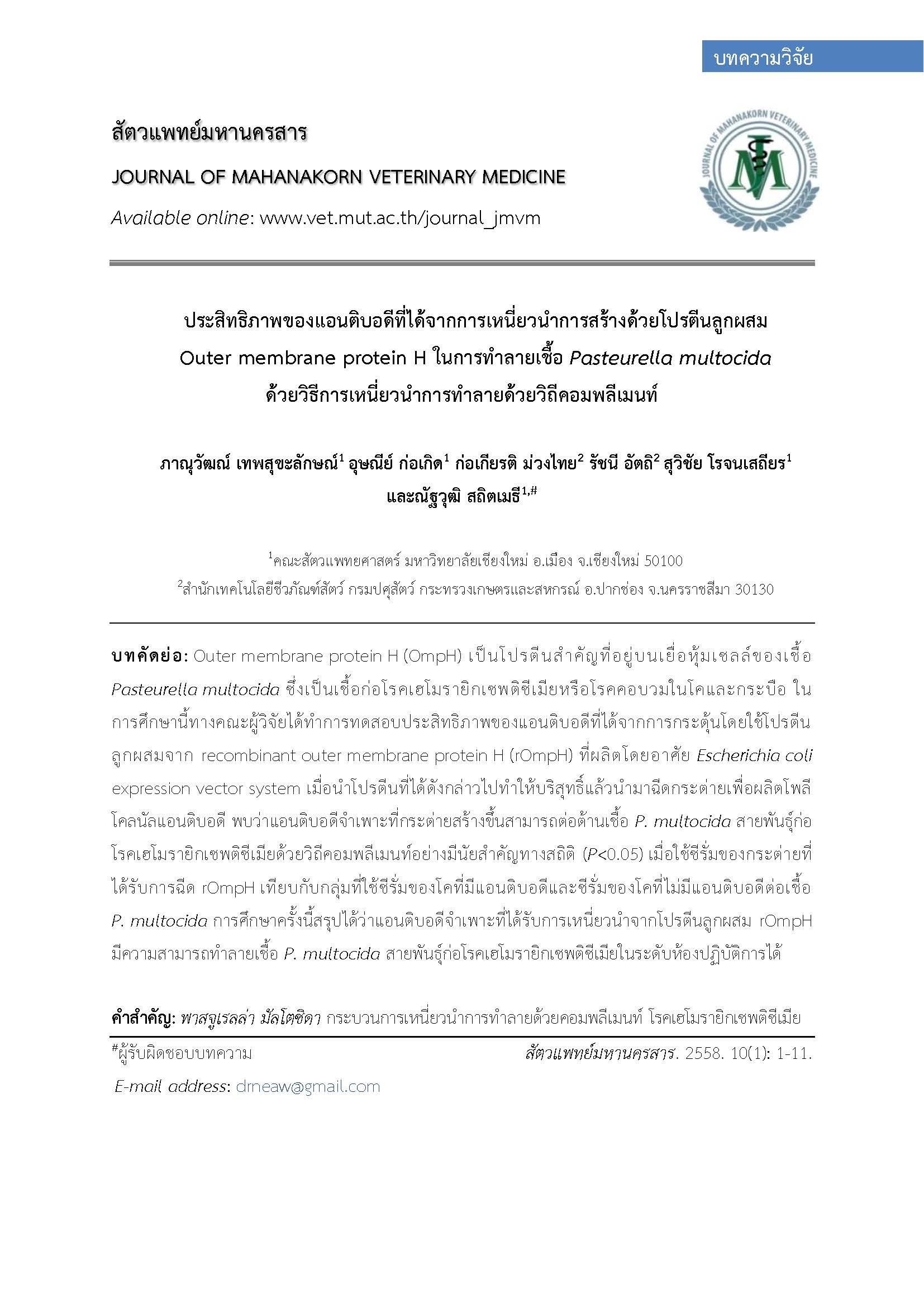Efficacy of Antibodies Conferred by the Recombinant Outer Membrane Protein H on Killing of Pasteurella multocida Strains by Complement-mediated Killing Assay
Main Article Content
Abstract
Outer membrane protein H (OmpH) is one of the major outer membrane protein found in membrane protein of the Pasteurella multocida, a causative animal pathogen of bovine hemorrhagic septicemia. In this study, we have evaluated the efficacy of antibodies which was immunized by the recombinant outer membrane protein H (rOmpH) expressed in Escherichia coli expression vector system. Polyclonal antibody against rOmpH was prepared in rabbit and performed as a source of antibody in the complement mediated killing assay. The results showed that there was a significant increase in killing of P. multocida when anti-rOmpH rabbit serum was used as the source of antibody compared with using the infected P. multocida bovine serum or antibody-free P. multocida bovine serum as the source of antibody. These results suggested that the antibody induced by the rOmpH could induce the activation of complement to destroy pathogenic strains of P. multocida. The killing of P. multocida by anti-rOmpH antibody was significant higher than serum from infected with P. multocida and non-vaccinated group (P < 0.05). In conclusion, antibody raised against rOmpH can destroy P. multocida strains in a laboratory level.
Article Details
References
Bradford, M.M. 1976. A rapid and sensitive method for quantitation of microgram quantities of protein utilizing the principle of protein-dye binding. Anal. Biochem. 72: 284-354.
Confer, A.W., Ayalew, S., Montelongo, M., Step, D.L., Wray, J.H., Hansen, R.D. and Panciera, R.J. 2009. Immunity of cattle following vaccination with a Mannheimia haemolytica chimeric PlpE–LKT (SAC89) protein. Vaccine. 27: 1771-1776.
Joshi, S., Tewari, K. and Singh, R. 2013. Comparative immunogenicity and protective efficacy of different preparations of outer membrane proteins of Pasteurella multocida (B:2) in a mouse model. Vet. Arhiv. 83, 665-676.
Laemmli, U.K. 1970. Cleavage of structural proteins during the assembly of the head of bacteriophage T4. Nature. 227: 680-685.
Lee, J., Kim, Y.B. and Kwon M. 2007. Outer membrane protein H for protective immunity against Pasteurella multocida. J. Microbiol. 45: 179-184.
Luo, Y., Glisson, J.R., Jackwood, M.W., Hancock, R.E.W., Bains, M., Cheng, I.N. and Wang, C. 1997. Cloning and characterization of the major outer membrane protein gene (ompH) of Pasteurella multocida X-73. J. Bacteriol. 179: 7856-7864.
Luo, Y., Zeng, Q., Glisson, J.R., Jackwood, M.W., Cheng, I.N. and Wang, C. 1999. Sequence analysis of Pasteurella multocida major outer membrane protein (OmpH) and application of synthetic peptides in vaccination of chickens against homologous strain challenge. Vaccine. 17: 821-831.
McQuillen, D.P., Gulati, S. and Rice, P.A. 1994. Complement-mediated bacterial killing assays. Methods Enzymol. 236: 137-146.
Okay, S., Ozcengiz, E., Gursel, I. and Ozcengiz, G. 2012. Immunogenicity and protective efficacy of the recombinant Pasteurella lipoprotein E and outer membrane protein H from Pasteurella multocida A:3 in mice. Res. Vet. Sci. 93: 1261–1265.
Pandher, K., Confer, A.W. and Murphy, G.L. 1998. Genetic and immunologic analyses of PlpE, a lipoprotein important in complement-mediated killing of Pasteurella haemolytica serotype 1. Infect. Immunol. 66: 5613-5619.
Rimler, R.B., Glisson, J.R. 1997. Fowl Cholera, p.143-159. In Calnek, B.W. and Barnes, H.J. (eds.), Diseases of Poultry, 10th ed. Iowa State University Press, Ames, IA.
Rimler, R.B. and Rhoades, K.R. 1989. Pasteurella multocida and Fowl Cholera, p.37-74, 95-114.In Adlam, C. and Rutter, J.M. (eds.), Pasteurella and Pasteurellosis, 1st ed. Academic Press Limited, London.
Singh, A.P., Singh, S., Ranjan, R., Gupta, S.K., Singh, V.P. and Sharma, B. 2010. Molecular heterogeneity of plpE gene in Indian isolates of Pasteurella multocida and expression of recombinant PlpE in vaccine strain of P. multocida serotype B:2. J. Vet. Sci. 11(3): 227-233.
Sthitmatee, N., Numee, S., Kawamoto, E., Sasaki, H., Yamashita, K., Takahashi, N., Kataoka, Y. and Sawada, T. 2008. Protection of chickens from fowl cholera by vaccination with recombinant adhesive protein of Pasteurella multocida. Vaccine. 26: 2398-2407.
Taylor, P.W., 1992. Complement-mediated killing of susceptible gram-negative bacteria: an elusive mechanism. Exp. Clin. Immunogenet. 9: 48-56.
Thanasarasakulpong, A., Poolperm, P., Tankaew, P., Sawada, T. and Sthitmatee, N. 2015. Protectivity conferred by immunization with intranasal recombinant outer membrane protein H from Pasteurella multocida serovar A1 in chickens. J. Vet. Med. Sci. 77(3): 321–326.


